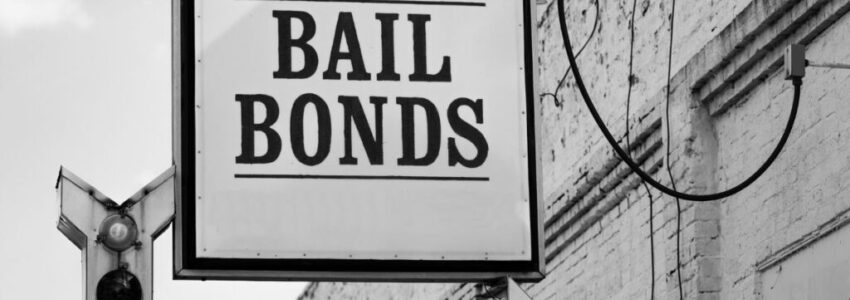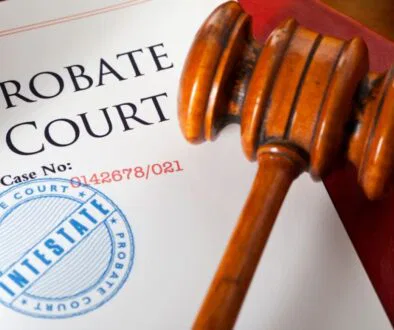How Does Bail Bond Work? – A Quick Guide

Published September 20, 2022
When someone is arrested but can’t afford to post bail, they often turn to bail bonds. But even though bail bonds have been regularly featured in true crime documentaries, cop shows, and police dramas, not a lot of people understand how it works.
If you also find yourself wondering “how does bail bond work?”, then you came to the right place. Here’s a quick guide on what a bail bond is, how it differs from bail, and most importantly, how bail bonds work.
What is Bail?
Familiarizing yourself with the bailing process will help you better understand how bail bonds work.
By definition, bail is a predetermined sum of money that serves as an insurance policy between the court and the person arrested (the defendant). It’s used to make sure that the defendant will show up in all court hearings and sessions requiring their presence.
Once bail is posted, the defendant will be released from custody and will remain so until they are found guilty of the crime they’re charged with. The bail money will also be returned to them after the trial, regardless of the verdict. But if the defendant skips on their bail and misses any one of their court dates, they’ll be rearrested and the bail will be forfeited.
Contrary to popular belief, bail is not always paid in cash. In the US, bail can also come in the form of:
The bail amount usually depends on the severity of the crime and how likely the defendant will skip town. To deter defendants from skipping their bail, the amount is usually set way above their spending capacity. If the defendant can’t post bail, they’ll have to stay in prison until the trial is concluded.
What is a Bail Bond?
A bail bond is a type of surety bond issued by a third party (usually a bail agent or bail bondsman to ensure a defendant’s release from jail. Because bail amounts often reach up to thousands of dollars, many defendants are financially unable to post bail on their own. As such, they seek assistance from a bail agent, also known as a bail bondsman, who posts a bail bond on their behalf.
Bail bonds are classified into two types:
- Criminal Bail Bond: Used in criminal situations, it assures that a defendant will appear for trial when summoned by the court and that the defendant will pay any fines or penalties imposed against him.
- Civil Bail Bond: used in civil trials to guarantee the defendant’s payment of the obligation, plus interest and charges.
Bail vs. Bail Bond
Bail and bail bond are two terms that are often used interchangeably. But they are two different concepts.
The main difference between bail and a bail bond is the person who pays them. Bail is the amount a defendant has to pay to secure their own release. While a bail bond is money or a bond that a third party pays or issues to secure a defendant’s release.
In short, if a defendant used their own money to post bail, it’s just bail. But if a third party like a bail bonds company pays the bail or issues a surety bond on their behalf, it’s a bail bond.

ADVERTISEMENT
How Bail Bonds Work
When someone is arrested for a crime, they are held in jail until their court date or until the judge decides to release them on bail.
During the arraignment or bail hearing, the judge establishes the bail amount. If the defendant cannot pay the bail sum on their own, a bail bondsman may pay it for them.
But before the bail agent will post a bail bond, the defendant usually has to pay them a percentage of the bail amount first. The amount varies but it can range from 10% to 20%. This amount is non-refundable even if the defendant didn’t skip bail. Think of it as a payment for the bail bond agent’s services.
Aside from the non-refundable deposit, the bail bondsman will ask for collateral to secure the remainder of the bail sum. If the defendant lacks sufficient collateral, the bail bonds agent may seek assistance from relatives and friends to issue a guarantee for the bail.
What happens next is contingent upon the defendant’s appearance in court upon his release.
If the defendant fails to appear in court, the bail bond is forfeited, and the court seeks payment of the remaining 90% of the bail. The bail bonds agent will pay the court the remaining bail sum using the defendant’s collateral (home, jewelry, securities, etc.).
If the defendant shows up in all of their court hearings until the conclusion of the trial, the bail bond is dissolved and all bail payments made will be refunded. The collateral is returned by the bail agent and everyone goes on their way.
Real-Life Example
So, how does bail bond work? For instance, John is apprehended. John’s bail was set at $10,000 by the court. John wishes to be released from jail but lacks the $10,000 required in cash, so he seeks assistance from a bail bondsman to post a bail bond on his behalf.
The bondsman will charge John $1,000 to post a bail bond. The bondsman obtains security from John and/or John’s relatives for the remaining $9,000 of bail. Collateral can take the form of a car, a house, or jewelry, among other things.
As long as John shows up in all required court appearances, the bail bondsman will not need further funds, and the bail bond will be dissolved at the conclusion of John’s case. Thus, John’s relatives would receive his $9,000 in collateral back, but not the $1,000; the bondsman would keep the $1,000 as profit.
However, if John fails to appear in court, the bondsman will be required to pay the remaining $9,000 in bail. The bondsman would accomplish this by utilizing John’s collateral.
If John paid the $10,000 in cash, he would be entitled to a return regardless of the case’s outcome.
Reduce Your Jail Call Costs By Up To 90% Per Minute With GlobalTel
GlobalTel’s inmate calling service lowers jail call per minute rates by up to 90% for jail calls from US facilities. Sign up now and use the special jail call phone number we create for you to eliminate the long distance jail call fees. Try GlobalTel for only $45.99 for 90 days. Make US/domestic and international jail calls at the local rate and stay connected to your incarcerated loved ones for less. Learn more about how to sign up for calls from inmates here.

This Content Is Fact Checked
Our esteemed team of specialists has thoroughly validated the accuracy of this information. Discover further details about the rigorous editorial guidelines for our website here.
ADVERTISEMENT

About The Author
Judy Ponio is a professional writer for the GlobalTel blog. She works hard to ensure her work contains accurate facts by cross checking reputable sources and doesn’t settle for less. Her passion for telling stories about true crime and criminal justice has allowed her to create hundreds of articles that have benefited millions of people.




